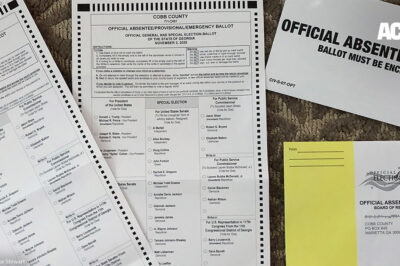ACLU Urges PA Legislature to Repeal Law Barring Ex-offenders from the Voting Booth
FOR IMMEDIATE RELEASE
PHILADELPHIA, PA — At a public hearing scheduled for this Thursday, March 2, the American Civil Liberties Union of Pennsylvania said it will urge the state legislature to repeal a law that bars ex-offenders from registering to vote for five years.
House Bill 1086, introduced last Spring by State Representative Andrew Carn (D-Philadelphia), would repeal a felony disenfranchisement provision placed into the Pennsylvania Motor Voter Act of 1995. This Thursday’s hearing before the Pennsylvania House State Government is in response to concerns that Pennsylvanian’s disenfranchisement law has a significant adverse impact in minority communities.
Larry Frankel, Executive Director of the ACLU of Pennsylvania, who is scheduled to testify on said that the ACLU supports the Carn bill.
“We believe that once an ex-offender has completed his or her time in prison, it is in society’s best interest that the ex-offender be allowed to rejoin society with the full rights of citizenship, including the right to register to vote and fully participate in the electoral process,” he said.
Frankel said the ACLU is particularly troubled by the racially discriminatory impact of Pennsylvania’s disenfranchisement law. This concern is heightened by the growing evidence that the criminal justice system unreasonably targets minorities, thus making it more likely that minorities will be disenfranchised.
In the context of this year’s election, Frankel noted that Pennsylvania should be making it easier, not more difficult, for citizens to participate in the electoral process.
“Many candidates are discussing the need for an inclusive style of politics. Those running for office claim they want to represent all people and not just the ones who look and act like they do,” he said. “Now is the time to show that such campaigning is not mere rhetoric. Now is the time to bring ex-offenders back into our communities by allowing them to participate in our most democratic on institutions – voting.”
–Frankel’s prepared testimony follows–
TESTIMONY ON HOUSE BILL 1086
AMERICAN CIVIL LIBERTIES UNION OF PENNSYLVANIA
TO THE PENNSYLVANIA HOUSE OF REPRESENTATIVES
STATE GOVERNMENT COMMITTEE
MARCH 2, 2000 – PHILADELPHIA
Good morning Chairman Clymer and other members of the State Government Committee. My name is Larry Frankel and I am the Executive Director of the American Civil Liberties Union of Pennsylvania. I want to thank you for inviting us to present testimony today on House Bill 1086.
The ACLU of Pennsylvania wholeheartedly supports House Bill 1086, legislation that would repeal the five year ban on voter registration that disenfranchises individuals who have been convicted of a felony and been confined in a penal institution. We believe that once an ex-offender has completed his or her time in prison, it is in society’s best interest that the ex-offender be allowed to rejoin society with the full rights of citizenship, including the right to register to vote and fully participate in our electoral process.
The right to vote is fundamental. As the United States Supreme Court said in Reynolds v. Sims, 377 U.S. 533, 555 (1964): The right to vote freely for the candidate of one’s choice is of the essence of a democratic society, and any restrictions on that right strikes at the heart of representative government.
The fundamental nature of the right to vote has been repeatedly affirmed by the United States Supreme Court. Dunn v. Blumstein, 405 U.S. 330 (1972); Evans v. Corman, 398 U.S. 419 (1970); Kramer v. Union Free School District No. 15, 395 U.S. 621 (1969). The Supreme Court has even noted that the right to vote preserves all other rights. Harper v. Virginia Board of Elections, 383 U.S. 663 (1966).
The United States Constitution prohibits the denial of the right to vote on the basis of race, sex or failure to pay a poll tax. Unfortunately, the United States Supreme Court has held that states may generally deprive criminal offenders of the right to vote without violating the Constitution, Richardson v. Ramirez, 418 U.S. 24 (1974). However, a state law that disenfranchises certain criminal offenders will be deemed unconstitutional if that law was adopted with racially discriminatory intent and has a disproportionate impact on nonwhite offenders. Hunter v. Underwood, 471 U.S. 222 (1985).
Even though the Constitution does not require that Pennsylvania allow ex-offenders to vote, the ACLU believes that there are sound policy reasons for doing so. First, we believe that there is no rational reason for disenfranchising felons. We agree with the observation made by the Ninth Circuit Court of Appeals, in Dillenburg v. Kramer, (1972) 469 F.2d 1222,1224: Courts have been hard pressed to define the state interest served by laws disenfranchising persons convicted of crimes. The temptation to identify the interest as state concern for additional punishment has been resisted because the characterization creates its own constitutional difficulties. Search for modern reasons to sustain the old governmental disenfranchisement prerogative has usually ended with a general pronouncement that a state has an interest in preventing persons who have been convicted of crimes from participating in the electoral process (e.g., Green v. Board of Elections of City of New York (2d Cir. 1967) 380 F. 2d 445, 451, cert. denied, 389 U.S. 1048, 88 S.Ct. 768, 19 L.Ed. 2d 840) or a quasi-metaphysical invocation that the interest is preservation of the ‘purity of the ballot box.’ (E.g., Washington v. State (1994) 75 Ala. 582, the venerable sire of abundant progeny; cf. Kronlund v. Honstein (N.D. Ga. 1971) 327 F. Supp. 71, 73.
Similar views were offered by Supreme Court Justice Thurgood Marshall in his dissenting opinion in Richardson v. Ramirez. Justice Marshall wrote: I think it is clear that the State has not met its burden of justifying the blanket disenfranchisement of former felons presented by this case. There is certainly no basis for asserting that ex-felons have any less interest in the democratic process than any other citizen. Like everyone else, their daily lives are deeply affected by the decisions of government. 418. U.S. 79.
Second, we are concerned about the racially discriminatory impact of Pennsylvania’s disenfranchisement law. Disenfranchisement laws recall the various kinds of voting prohibitions that have been historically used to make it more difficult for racial minorities to vote. The abolition of literacy requirements and the elimination of the poll tax were positive steps forward in enfranchising minority voters. Congress itself enacted the Voting Rights Act for the broad remedial purpose of ridding “the country of racial discrimination in voting.” South Carolina v. Katzenbach, 383 U.S. 301, 315 (1966). The Voting Rights Act “was enacted in response to the increasing sophistication with which states were denying racial minorities the right to vote.” Farrakhan v. Locke, 987 F. Supp. 1304,1308 (E.D. Wash. 1997).
There can be little doubt that Pennsylvania’s felony disenfranchisement law disproportionately dilutes the voting rights of African-Americans in Pennsylvania. For a variety of reasons, blacks receive a prison sentence for committing a felony far more often than whites do. Much of this has to do with how discretion is exercised by police officers, prosecutors and judges. One major factor is the phenomenon of racial profiling – the unreasonable targeting of minorities by law enforcement officials. It must also be acknowledged that unspoken racial attitudes effect all participants in the criminal justice system in ways that adversely impact on African-Americans. These factors result in Pennsylvania’s disenfranchisement law having a tremendous impact on the voting strength of the African-American community and the adverse consequences associated with that impact needs to be addressed.
On Wednesday, April 21, 1999, an editorial in The York Dispatch specifically mentioned the disproportionate harm caused by the registration ban: It’s unclear how many Pennsylvanians are prohibited from voting by the five-year ban on felons, but one estimate put that number at about 86,000 to 101,000. And they’re mostly from minority communities, areas where voter turnout is typically low to begin with. It’s just another barrier to democracy in those neighborhoods, further alienating minorities from ‘the system,’ breeding resentment, anger, and even excuses for the cycle of failure. So what does disenfranchising ex-cons really accomplish, aside from acting as a form of mean-spirited double jeopardy?
Finally, we think that it would only be appropriate during this very important election year for the Commonwealth of Pennsylvania to seek to expand the franchise. We are electing a President and Pennsylvania has a hotly contested race for United States Senator. Half of the seats in the Pennsylvania Senate and all of the seats in the Pennsylvania House of Representatives are up for re-election. Everyone knows that the party in the majority after election day will exert considerable influence in next year’s redistricting decisions. This is a crucial election year and Pennsylvania should be making it easier to vote.
Many candidates are discussing the need for an inclusive style of politics. Those running for office claim they want to represent all people and not just ones who look and act like they do. Now is the time to show that such campaigning is not mere rhetoric. Now is the time to bring ex-offenders back into our communities by allowing them to participate in our most democratic of institutions – voting.
Stay Informed
Every month, you'll receive regular roundups of the most important civil rights and civil liberties developments. Remember: a well-informed citizenry is the best defense against tyranny.



